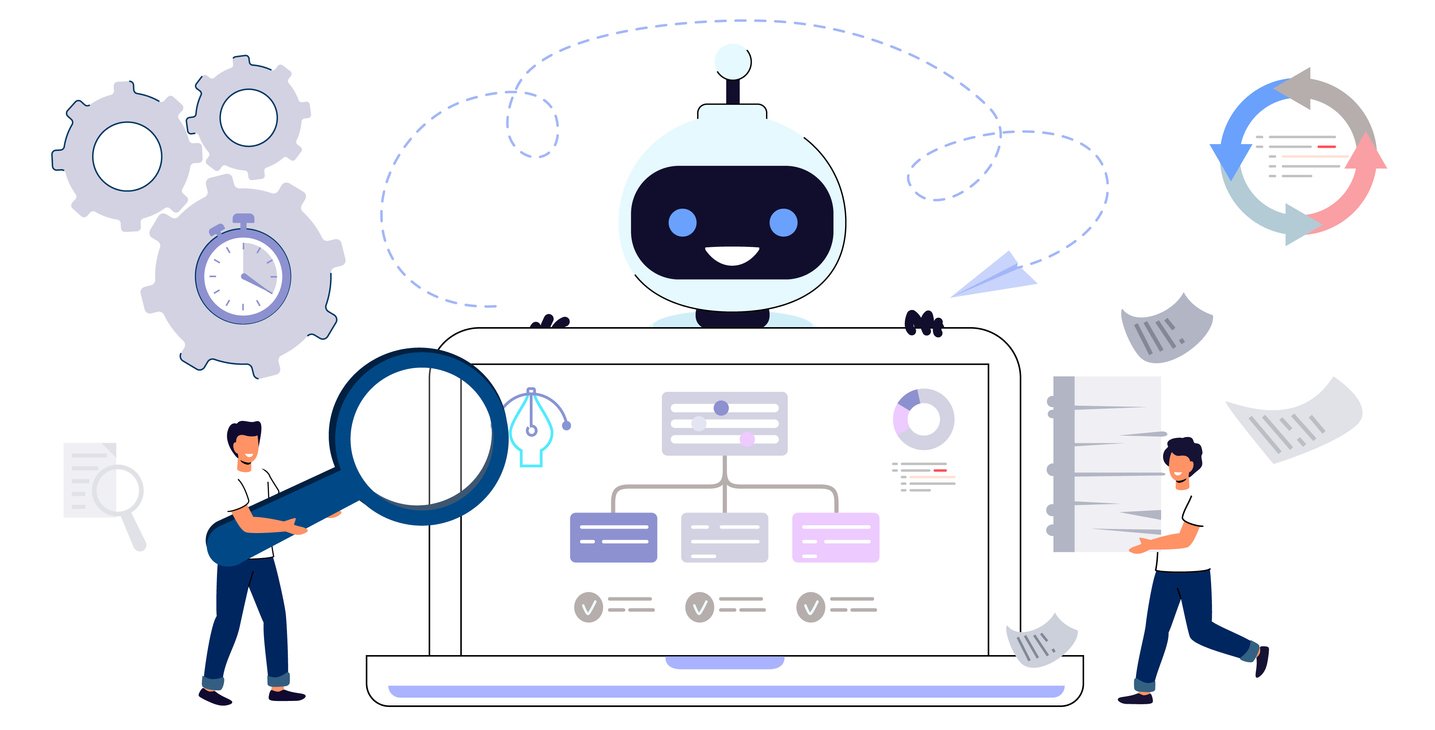
Customer Service Automation: Futuristic Customer Support
 Updated on
Updated on
 By Bradley Kovacs
By Bradley Kovacs
Bradley Kovacs
Bradley has been passionate about technology since childhood, starting with Microsoft Flight Simulator at age six. In college, he automated his data e...
learn more
Bradley Kovacs
Bradley has been passionate about technology since childhood, starting with Microsoft Flight Simulator at age six. In college, he automated his data e...
Table of Contents
Table of Contents
In an era where customers expect instant gratification, keeping up can feel like running a marathon in a three-piece suit.
Fortunately, customer service automation is here to help you ditch the sweat and focus on the finish line.
By leveraging technology to handle the heavy lifting of routine tasks, customer service and marketing automation not only streamlines your operations but also enhances the client experience.
Think of the automation of customer service as your behind-the-scenes crew, working tirelessly to ensure your customer interactions are smooth, efficient, and, most importantly, consistently delightful.
In this article, we're going to explore the ins and outs of customer service automation, guiding you through its core components, benefits, software, and more!
What Is Customer Service Automation?

Now, let's answer the question on everyone's mind, "What is customer service automation?"
Customer service automation involves using technology to handle routine tasks traditionally performed by human agents. This includes automating responses to common inquiries, managing support tickets, and processing requests.
The goal of automation customer service is to streamline customer interactions, improve efficiency, and ensure that service is consistent and reliable.
By integrating these tools, businesses can handle a higher volume of interactions with greater efficiency and accuracy. This not only improves operational efficiency but also enhances the overall customer automation experience.
The History of Customer Service Automation
To appreciate the impact of customer service automation, it's helpful to understand its evolution over time.
- Early Beginnings (1960s-1980s): The first wave of customer service automation began in the early 1960s with basic systems that managed tasks like call routing and information retrieval. These systems were rudimentary but laid the foundation for future advancements.
- The Internet Era (1990s): The rise of the Internet in the 1990s brought significant changes to customer care automation. Early forms included customer service email automation and basic chatbots. These tools began to handle more complex tasks and manage a growing number of customer interactions.
- The AI Revolution (2000s-Present): The 2000s marked the advent of advanced technologies such as AI sales tools and machine learning. These innovations enabled the development of more sophisticated automation customer support tools capable of understanding and processing natural language, predicting customer needs, and providing personalized responses.
Today, customer support automation software is powered by AI, machine learning, and natural language processing, offering businesses powerful tools to enhance their customer service operations and stay competitive in a rapidly evolving marketplace.
Customer Service Automation Software

Customer support automation and AI call center software are like the Swiss Army knife of customer support. It's a comprehensive toolkit designed to handle a wide range of tasks, from managing customer inquiries to providing detailed performance insights. Integrating these tools into your operations can streamline your support processes and enhance overall efficiency.
Here's a closer look at what the best customer service automation software entails:
- Ticketing Systems: These systems are essential for organizing and prioritizing customer requests. They manage the entire lifecycle of a support ticket, from creation to resolution, ensuring that each issue is addressed in a timely manner. Features often include ticket assignment, status tracking, and escalation protocols.
- Chatbots: AI-powered chatbots are increasingly sophisticated, capable of simulating human conversation and handling a variety of customer support task automation processes. They can answer common questions, provide recommendations, and even guide customers through complex processes, all without human intervention.
- Automated Email Responses: Automated email systems streamline communication by generating and sending replies based on predefined rules. This ensures that customers receive prompt responses, reducing the need for manual email management and improving overall efficiency.
- Analytics Tools: These tools provide valuable insights into customer interactions, helping you understand behavior patterns, measure satisfaction, and identify areas for improvement. Analytics tools often include features like data visualization, trend analysis, and performance reporting.
Incorporating these tools into your customer retention strategy can enhance efficiency, reduce manual effort, and provide a more seamless experience for your customers.
Popular Software Solutions
In today's fast-paced business environment, automation in customer service has become essential for maintaining high efficiency and customer satisfaction levels. With various software solutions available, each designed to address specific aspects of customer interaction, choosing the right tool can significantly impact your service quality and operational effectiveness.
To help you make an informed decision, we've compared some of the leading customer service and support automation software options.
Each solution offers distinct features and benefits that cater to different needs and preferences.
|
Software |
Key Features |
Best For |
|
CRM, VoIP calling, sales pipeline management, insights into customer behavior |
Insurance, SaaS, remote sales teams |
|
|
Robust ticketing system, live chat, social media integration, user-friendly interface |
Streamlining support operations |
|
|
Ticket management, customer support, knowledge base creation, intuitive interface |
Enhancing customer service operations |
|
|
Case management, chatbots, AI-driven analytics, integration with other Salesforce products |
Personalized and efficient support |
Each software solution offers a unique set of features designed to enhance different aspects of customer service. You can select the best tool to streamline your operations and improve customer satisfaction by evaluating these options based on your specific needs and business goals.
Investing in the right customer service automation software can lead to more efficient workflows, better customer interactions, and a stronger overall service strategy. Choose wisely to ensure that your chosen solution aligns with your business objectives and effectively supports your team.
Features and Functionalities
Imagine having a tireless assistant who never sleeps, always stays calm, and has a knack for solving problems. That's essentially what customer service automation software is. It's a digital sidekick that helps businesses handle customer inquiries efficiently and effectively.
At the heart of this technology are ticketing systems. Think of them as virtual inbox organizers. Every customer question or complaint becomes a ticket, neatly categorized and assigned to the right person. This keeps things tidy and ensures no query falls through the cracks.
Then there are chatbots, those friendly digital helpers that can answer common questions and resolve simple issues in the blink of an eye. They're like having a mini customer service rep available 24/7, freeing up human agents to tackle more complex problems.
But the real magic happens with AI-driven insights. By analyzing customer interactions, this smart software can spot patterns and trends. It's like having a crystal ball that can predict customer needs and help businesses improve their services. For example, if many customers are asking about a particular product feature, the software can flag this as a potential improvement area.
So, while customer service automation might sound like cold, robotic efficiency, it's actually a tool that empowers human agents to do their best work.
Customer Service Automation Solutions

Customer service automation solutions come in various forms, each designed to address specific needs and challenges. Understanding the different types of solutions available and how they can be tailored to specific industries will help you decide which tools to implement in your organization.
Types of Solutions
Automation for customer service can be broadly categorized based on its functionality and application:
- AI Chatbots: These tools provide automated responses to customer inquiries, handling routine questions and tasks. AI chatbots use natural language processing to understand and respond to customer needs effectively.
- Automated Email Responses: Automate the process of sending email replies based on predefined triggers and templates. This helps in managing high volumes of customer inquiries and ensuring timely responses.
- Self-Service Portals: These allow customers to access information, resolve issues, and manage their accounts independently. They reduce the need for direct support and empower customers to find solutions on their own.
Each one of these customer service automation examples offers unique advantages, and selecting the right combination depends on your specific customer service goals and requirements.
Industry-Specific Solutions
Different industries have unique needs that can be addressed through tailored automation solutions:
- Insurance: Automation tools in the insurance industry streamline processes such as policy management, claims processing, and customer onboarding. These tools help reduce administrative overhead and improve efficiency.
- Healthcare: In healthcare, automation solutions handle tasks such as appointment scheduling, patient inquiries, and medical record management. These tools enhance patient engagement and streamline administrative workflows.
- Finance Services: Financial institutions use automation to manage account-related tasks, transaction processing, and customer support. Automation helps ensure compliance, improve efficiency, and enhance the customer experience.
Implementing industry-specific solutions can help you address unique challenges and provide more effective and personalized service to your customers.
Customer Service Automation Benefits

The benefits of customer service automation are manifold, ranging from improved efficiency to enhanced customer satisfaction. You can transform your customer service operations by leveraging automation and achieving better outcomes.
Let's explore how automation can benefit your organization.
Efficiency and Productivity
Automation drives efficiency and productivity in several ways:
- Handling Repetitive Tasks: Automation takes over routine and repetitive tasks, such as answering frequently asked questions and processing standard requests. This frees up your team to focus on more complex issues and adds value to your business.
- Streamlined Processes: Automated systems simplify processes like ticketing and response generation, reducing manual effort and minimizing errors. This leads to faster and more accurate completion of tasks.
- Improved Resource Allocation: By automating routine tasks, you can allocate resources more effectively, ensuring that your team focuses on tasks that require expertise and creativity. This optimizes overall resource management and cost efficiency.
Customer service automation enhances efficiency and productivity by managing routine tasks, streamlining processes, and improving resource allocation.
Cost Savings
Incorporating automation into your customer service strategy can lead to significant cost savings across various dimensions of your operations. Businesses can reduce expenses and improve overall efficiency by automating routine tasks and streamlining processes.
Let's break down how automation contributes to cost savings and explore the specific areas where these benefits manifest.
|
Cost Saving Aspect |
Description |
Impact |
|
Reduced Labor Costs |
Automation handles routine tasks, reducing the need for a large customer service team. |
Lowers labor expenses and allows the reallocation of resources. |
|
Decreased Error Rates |
Automated systems reduce human errors and inconsistencies, minimizing the need for corrections. |
Lowers operational costs associated with error management. |
|
Enhanced Efficiency |
Streamlined processes through automation result in faster resolution times and less manual effort. |
Decreases operational expenses by improving productivity. |
Customer service automation not only helps reduce labor needs and error rates but also improves efficiency across various functions. By integrating automation into your customer service operations, you can achieve significant cost savings and enhance the overall effectiveness of your business processes.
24/7 Availability
One of the standout benefits of incorporating automation into your customer service strategy is the ability to provide round-the-clock support. This continuous availability meets customer expectations and significantly enhances their overall experience with your brand.
Imagine never having to turn away a customer or miss an inquiry simply because it's outside of regular business hours. Customer service automation, through tools like chatbots and self-service portals, offers exactly that—uninterrupted support whenever your customers need it.
This capability is particularly crucial in today's global marketplace, where customers are spread across various time zones.
Let's delve into the key ways that 24/7 automation can transform your customer service operations.
|
Advantage |
Description |
Impact |
|
Continuous Support |
Automated systems like chatbots and self-service portals provide assistance around the clock. |
Ensures help is always available, improving customer satisfaction. |
|
Global Reach |
With 24/7 support, you can seamlessly cater to customers in different time zones. |
Expands your customer base and enhances service accessibility. |
|
Consistent Service |
Automation delivers uniform service without the constraints of human working hours. |
Maintains a high level of service quality and consistency. |
The ability to provide continuous support through automation is a game-changer for customer service. It not only meets the expectations of modern consumers who demand accessibility at all hours but also enhances your operational efficiency and global reach.
Improved Customer Experience
Automation has a profound impact on the customer experience, transforming how businesses interact with their clients and addressing common pain points. One of the most significant ways automation enhances the customer experience is through faster response times.
Automated systems, such as chatbots and automated ticketing, provide near-instantaneous replies to customer inquiries. This rapid response capability is crucial in reducing wait times, which can often frustrate customers and lead to dissatisfaction. By eliminating delays and providing immediate assistance, automation ensures that customers receive the help they need promptly, greatly improving their overall experience and fostering a more positive perception of your brand.
Another key benefit of automation is its ability to deliver personalized interactions. Advanced automation tools leverage customer data and preferences to tailor responses and support to individual needs. For instance, automated systems can access past interactions, purchase history, and preferences to offer relevant recommendations and solutions to each customer. This level of personalization creates a more engaging and relevant experience, as customers feel understood and valued. By providing support that resonates with their specific needs, automation helps build strong customer relationship management etiquette and enhances overall satisfaction.
Efficient issue resolution is another area where automation shines. Automated systems streamline the process of resolving customer concerns by directing inquiries to the appropriate resources or agents.
For example, automated ticketing systems can categorize issues and route them to the right department, while self-service portals can provide instant answers to common questions. As a result, customers experience less frustration and receive quicker, more effective support.
Customer Service Automation Trends

Customer service automation is constantly evolving, with new trends shaping how businesses interact with their customers.
Staying informed about these trends will help you leverage the latest technologies and practices to enhance customer service operations.
AI and Machine Learning
Artificial Intelligence and machine learning are transforming customer service automation by offering advanced capabilities that enhance how businesses interact with customers.
One of the most significant advancements is predictive analytics. AI-powered analytics analyze vast amounts of customer data to uncover:
- Patterns
- Trends
- Behaviors
- Preferences
For instance, businesses can provide a more tailored and responsive service by predicting potential issues before they arise or suggesting personalized solutions based on previous interactions.
Enhanced chatbots represent another area where machine learning is making a substantial impact. Traditional chatbots often struggle to understand and respond to complex or nuanced queries.
However, advancements in machine learning have significantly improved their capabilities.
Modern chatbots, powered by sophisticated AI algorithms, can now comprehend intricate questions, engage in more natural conversations, and provide accurate, context-aware responses.
Furthermore, AI's role in automating routine tasks cannot be overstated. Automation powered by AI handles repetitive and mundane tasks such as data entry, scheduling, and basic customer inquiries with remarkable efficiency.
Omnichannel Integration
In today's fast-paced digital landscape, omnichannel integration has emerged as a crucial trend in customer service automation. This approach involves seamlessly connecting multiple communication channels to offer customers a unified and cohesive experience. Businesses can ensure their customers enjoy a smooth and consistent service journey by integrating various channels—email, live chat, social media, and phone support.
One of the primary advantages of omnichannel integration is the unified customer experience it provides. When customer service interactions are connected across different channels, customers can transition between them without losing context.
For instance, if a customer starts a conversation via live chat and later follows up through email or social media, the service team can access the entire history of interactions. This continuity helps maintain a coherent dialogue, reducing the need for customers to repeat themselves and enhancing their overall satisfaction with the service.
Omnichannel integration also facilitates centralized customer service management. Instead of juggling multiple systems or customer service automation platforms, businesses can use a centralized solution to handle all customer communications. This centralized approach streamlines operations by consolidating data and interactions into a single platform. It not only simplifies the customer service automation management process but also improves operational efficiency, as agents can quickly access information and provide timely responses.
Additionally, omnichannel integration ensures consistent service delivery across various touchpoints. With a unified system, you can standardize your service quality and maintain a uniform level of support regardless of the channel used.
Personalization
Thanks to the power of automation, customer service is evolving into a more personal and engaging experience. Gone are the days of generic interactions; today's technology allows businesses to delve deep into customer data to understand individual preferences and behaviors. This means tailored recommendations, customized responses, and solutions that truly address specific needs. Imagine having a virtual assistant who knows your history, anticipates your requests, and delivers exceptional support.
By leveraging automation, you can create highly personalized customer journeys. From the moment a customer interacts with a brand, they're met with relevant and engaging experiences.
Whether suggesting products based on past purchases or providing targeted support, automation ensures that every customer feels valued and understood.
Ultimately, this focus on personalization leads to increased customer satisfaction and loyalty.
When customers feel like they're being heard and their needs are prioritized, they're more likely to become repeat customers and brand advocates. This is a win-win situation for both businesses and consumers.
Voice Assistants
Voice assistants are no longer a futuristic concept. They're here, and they're transforming customer service. Imagine your customers being able to interact with your business in the most natural way possible – through conversation. Voice assistants are equipped to handle complex inquiries, just like skilled human agents.
From troubleshooting to providing information, they can manage a vast array of customer needs.
But the benefits go beyond handling queries.
Voice assistants offer unparalleled convenience. Your customers can get the help they need without lifting a finger. This accessibility can significantly enhance the customer experience and boost satisfaction.
And let's not forget integration. These intelligent tools can work seamlessly with your existing customer service systems, creating a unified and efficient support experience. By embracing voice assistants, you're not just adopting a new technology but investing in a future where your customers feel heard, valued, and supported.
Customer Service Automation - Final Thoughts

The way businesses interact with customers is changing rapidly. Customer service automation is at the forefront of this transformation, offering unprecedented opportunities to boost efficiency, cut costs, and elevate customer satisfaction.
Ringy is your partner in this journey. Our innovative platform allows you to streamline customer service operations and deliver exceptional support.
Imagine handling a higher volume of inquiries with fewer resources while ensuring every customer feels valued. With Ringy, this isn't a dream - it's a reality.
Ready to unlock the full potential of your customer service team? Let our CRM sales software help you transform your business.
Request a demo and discover how our solution can drive your success.

Skyrocket your sales with the CRM that does it all.
Calling? Check. SMS? Check. Automation and AI? Check. Effortlessly keep in touch with your customers and boost your revenue without limits.

Take your sales to new heights with Ringy.
Sales in a slump? Ringy gives you the tools and flexibility you need to capture leads, engage with them, and turn them into customers.
Subscribe to Our Blog
Enter your email to get the latest updates sent straight to your inbox!
Categories
Related Articles






































































